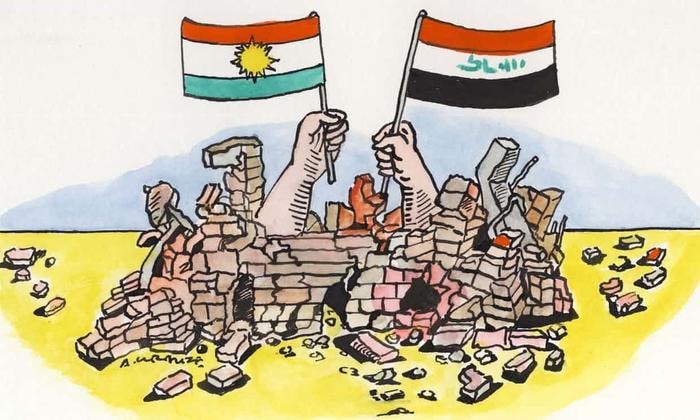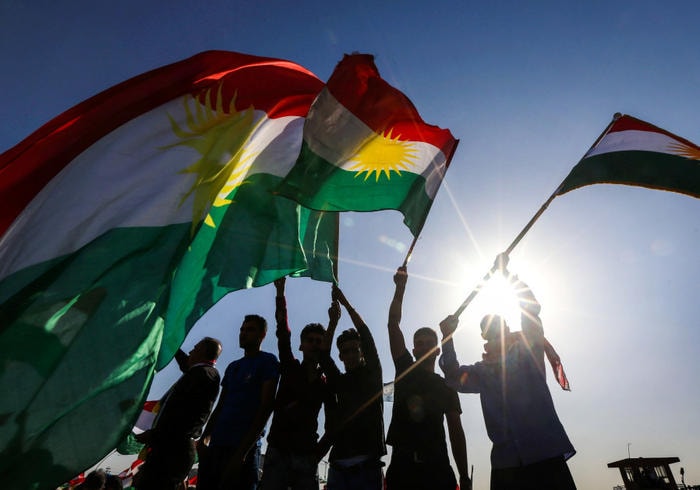Unable to bear the pressure, the Kurds 'de-escalate'
(Baonghean) - By holding a referendum, the Kurds hope to gain more advantages over the Iraqi central government to demand greater autonomy. But recent steps show that things are not going in the direction they calculated.
Unexpected move
In a statement, the Kurdish autonomous region government made three proposals to the central government: immediately stop all military activities in the Kurdish autonomous region to prevent the conflict from going further, "freeze" the results of the referendum, and organize an open dialogue between the Kurdish autonomous region government and the Iraqi government based on the constitution.
Previously, on October 19, they also made a similar proposal after announcing the postponement of legislative and regional leadership elections.
 |
| The Kurdish autonomous region is in a weak position in the confrontation with the Iraqi government (The Guardian) |
The surprise was that the Kurdish autonomous region's government voluntarily "froze" the results of the referendum - which they saw as a tool to put pressure on the central government to demand greater autonomy.
This is probably a proposal that the Kurdish autonomous region government would have a hard time making, because previously, despite strong measures from the central government, the region still decided to set the election date for November 1.
In a statement making three proposals to the Iraqi central government, the Kurdish autonomous region government expressed its “common interest” by saying that “continuing to fight will not bring victory to either side, but will lead the country to decline and chaos.”
But according to analysts, the Kurdish autonomous region is forced to take successive steps to appease the Iraqi government because the actual situation is not favorable for pursuing its demands for greater autonomy, let alone independence.
“De-escalating” and finding a way to bring the Iraqi government to the negotiating table is the way for the Kurdish autonomous region to avoid the scenario of losing everything before achieving its goals.
Unequal confrontation
Since the Kurdish autonomous region held a referendum for independence in late September, the Iraqi central government has issued many stern warnings that it will “use Iraqi law to resolve” if the autonomous region does not cancel the referendum results because it is a common threat to the peaceful coexistence of Iraqis and a danger to the region.
Proving that this was not an empty warning, the Iraqi government issued a ban on all international flights to and from the capital of the Kurdish autonomous region, Arbril.
From October 3, the Central Bank of Iraq also announced that it would stop selling USD to the four leading Kurdish banks as well as stop all foreign currency transactions with this autonomous region.
The Iraqi government's drastic measures were also supported by a series of countries in the region, most notably Iran and Türkiye, which closed and stopped trade with the Kurdish autonomous region.
Along with the "internal and external" steps that directly hit the economy, the Iraqi government also dealt a heavy blow to the "commanding center" of the independence movement by issuing arrest warrants for three high-ranking Kurdish officials for organizing the independence referendum, and arresting Deputy Governor of the Kurdish autonomous region Kosrat Rasul on charges of "provocation" against the Iraqi armed forces.
But the most decisive step by the Iraqi government that forced the Kurdish autonomous region to "de-escalate" was the government army's attack on Kirkuk - an oil-rich area and a disputed territory between the two sides.
Faced with government forces, Kurdish forces quickly lost the K1 airbase, the city's airport and many important oil fields, followed by the town of Sinjar, several other villages and towns in Kirkuk province.
 |
| Kurds' dream of independence unlikely to come true (AFP) |
Government forces also captured the Mosul Dam near the capital of Nineveh province and the province’s Rabia border strip, which borders Syria. The Kurdish forces’ expulsion from Kirkuk meant the loss of the region’s most important financial resource.
When the autonomous Kurdish region held a referendum for independence, international opinion judged that their chances of gaining independence were very slim.
Their biggest hope is to use the results of the referendum, in which over 92% of voters voted for independence, to pressure the Iraqi central government at the negotiating table, thereby demanding greater autonomy.
But just like the story unfolding in Catalonia, Spain, the autonomous Kurdish region in Iraq is in a completely weak position in its confrontation with the central government: no support from the international community, no legitimacy because it is considered unconstitutional, no military power, and its economic potential is cut off.
Not only that, the US - the country considered the "backer" of the Kurdish forces in Iraq - has publicly declared that it does not support anyone in this confrontation. Without US support, the Kurds will not be an opponent of the Iraqi government in any aspect.
Therefore, it is likely that the Kurdish autonomous region's proposal for dialogue will be accepted, but they will have little chance to make demands for greater autonomy.
Thuy Ngoc
| RELATED NEWS |
|---|
